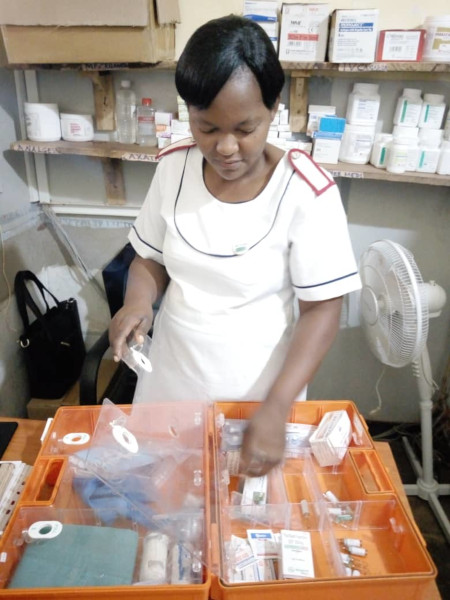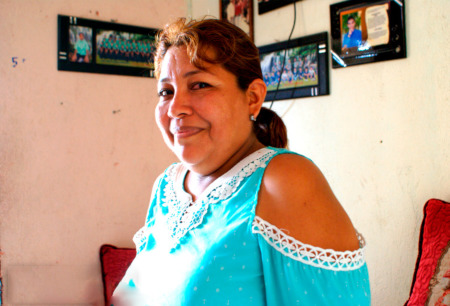Cancer Care a Vital Part of PIH Programs Around the World
Posted on Feb 3, 2020
Partners In Health supported the care of more than 4,000 cancer patients around the world in 2019. Nearly all of those people would otherwise have had no access to chemotherapy and other critical treatments, highlighting the essential, lifesaving need for cancer services in impoverished communities.
PIH’s largest cancer programs are in Haiti and Rwanda. In Rwanda’s northern mountains, PIH-supported Butaro District Hospital is home to the Butaro Cancer Center of Excellence, which opened in 2012, provides an array of cancer treatment, services and support, and sees 1,700 new patients every year.
At PIH-supported University Hospital in Mirebalais, Haiti, we’re training the next generation of doctors, nurses, and medical residents to care for patients with cancer. They perform CT scans, take biopsies of tumorous tissues, and much more.
But PIH’s cancer care extends far beyond those two flagship programs. PIH provides vital cancer screening and services in several of the 11 countries where we work. Here is a quick look at cancer care in three of those locations: the East Africa nation of Malawi, Mexico, and Navajo Nation in the southwestern U.S.
Malawi
Abwenzi Pa Za Umoyo, as PIH is known in Malawi, provides cervical cancer screening at 14 PIH-supported health facilities across Neno District, in partnership with Malawi’s Ministry of Health.

Dr. George Talama, primary health care clinical manager for PIH in Malawi, said cervical cancer screening is part of the integrated chronic care clinic at Neno District Hospital. People come to the clinic to receive care for a variety of conditions, ranging from diabetes and high blood pressure to HIV and TB, and staff have screened more than 25 percent of those clients for cervical cancer so far. Cervical cancer care at the hospital also includes treatment for pre-cancerous tissue, Talama said.
Additionally, PIH provides chemotherapy at the hospital for Kaposi sarcoma, a form of skin cancer associated with HIV. While chemotherapy for Kaposi is available across Malawi, patients from other parts of the country often come to Neno District for treatment because of the hospital’s strong success rate.
For patients in late stages of cancer, PIH provides palliative care, primarily at Neno District Hospital and Lisungwi Community Hospital. Staff from those hospitals also provide palliative care to patients at regional health centers and in visits to their homes.
Talama said PIH currently is supporting more than 30 cancer patients across the district, including 18 people with Kaposi sarcoma and five with cervical cancer.
Mexico

Compañeros En Salud, as PIH is known in Mexico, helps cancer patients in the Sierra Madre mountains of Chiapas access an array of services. Our Right to Health Care program not only helps patients get referrals to the appropriate public hospital, but also provides social support to ensure they are able to actually receive that care. We cover the costs of food, lodging, transportation, and even insurance fees for patients, and help with clinical expenses including lab work, X-rays, ultrasounds and CT scans, as needed.
That support is reflected in the story of Doña Suyi Escobar, a wife and mother of three children who, about six years ago, found a lump in her right breast. When a biopsy at a regional health center confirmed she had breast cancer, a friend of her husband suggested they contact Compañeros En Salud. The PIH team helped Escobar’s family with lodging and transportation costs so they could access care, and supported her through radiation and chemotherapy.
Now recovered, Escobar said she advises other women to take care of themselves, perform self-exams to check for early signs of cancer, and most importantly, not to lose hope. Read Escobar’s story here.
Navajo Nation
Spanning 27,000 square miles and home to more than 300,000 people, the Navajo Nation is geographically the largest Native community in the United States. Community Outreach and Patient Empowerment, or COPE, is a Native-controlled nonprofit and sister organization of Partners In Health, and has been working on Navajo Nation since 2009.
Cancer is the leading cause of mortality for women on Navajo Nation, and the second-largest cause of mortality overall, but cancer screening rates are far lower than in other parts of the U.S.
The COPE Cancer Program works to improve patients’ outcomes through meaningful community engagement and education, with community-led initiatives including a Patient and Family Advisory Council, an annual Cancer Survivorship Conference, and the COPE Cancer Coalition.
COPE works with local stakeholders to develop and implement cancer education materials that are tailored for use in local communities, and to leverage technology to improve access to education and coordination of care.
Impacts include:
- 15 community members guide COPE programs and research, through the Patient and Family Advisory Council
- 92 outreach workers are trained in delivering the COPE-created, Navajo-specific Circle of Life cancer education curriculum
- 260 attendees learned and shared at COPE’s fifth annual, two-day Cancer Survivorship Conference
- 22 partners participate in COPE’s coalition to improve cancer outcomes on Navajo Nation
- 222 hours of engagement sessions with partners led to creation of a Community Action Plan

